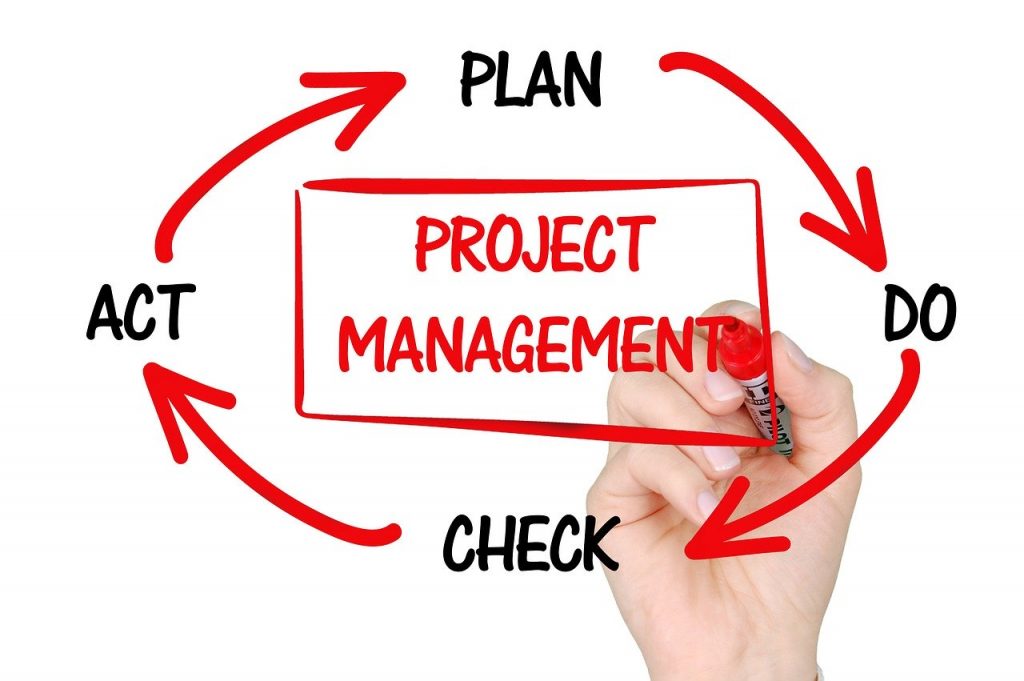A project manager performs functions of an overseer, contract administrator, liaison, and construction professionals.
The Bureau of Labor Statistics considers project managers to be construction managers who ensure the safe, quality, and efficient construction of buildings and infrastructure.
Project managers need education and experience to succeed in the job and obtain a license if necessary.
Article Table of Contents
What Does a Project Manager Do
Project managers are responsible for forecasting, leading, and responding during construction projects.
These professionals deal with multiple people interested in the project.
They communicate with clients, employees, inspectors, regulators, and supervisors.
Their duties include ensuring that the project is completed in accordance with the set time limits, budget, permits, and the needs of the end-user of the project.
Responsibilities
- Estimate the budgets, expenses, and time for completion of a project or its stages.
- Present estimates, specifications, and interpretations of contracts to clients and professionals.
- Cooperate with managers, professionals, and end-users for forming and finishing contracts and project specifications.
- Schedule the performance of stages of the project as well as the delivery of supplies.
- Delegate tasks to workers and other employees.
- Allocate equipment and supplies for a variety of tasks.
- Ensure that the project is carried out according to the budget and schedule.
- Address the delays in work, emergencies, accidents, and other issues.
- Report the status, changes to estimates or timing, and incidents to clients.
Project managers may also be responsible for ensuring compliance with safety, security, and other regulations.
Essential Skills
Communication:
Project managers need to deliver clear instructions to the team and inform the vendors, subcontractors, and suppliers of when to report to the site.
They have to ensure that no misunderstanding arises between clients and managers concerning expectations and challenges.
They have to be able to explain technical concepts in easy to understand language.
Analytical:
Project managers have to analyze conditions, facts, and needs in planning the performance of the project as well as respond to problems.
Project managers can use some analytical software for the analysis of various stages of the project or strategies on the execution of them.
Interpersonal:
Project managers regularly interact with clients, engineers, inspectors, managers, and other professionals.
By applying their interpersonal skills, they can effectively respond to orders to fix or stop the construction, obtain requests from clients and deal with workers and subcontractors.
Leadership:
Project managers head the teams, so they should be able to clearly instruct their members, delegate tasks, and monitor the work.
They should guide the teams, deliver the goals of the project and its stages, and resolve conflicts if they arise.
How to Become a Project Manager
Project managers need education related to construction fields.
They can develop their qualifications through education as well as experience, depending on the program.
Self-employed project managers need to meet particular standards to obtain a license in many jurisdictions.
Training and Qualifications
Project managers typically hold at least a bachelor’s degree.
The type of degree depends on the field.
Construction project managers study construction science, building science, or construction engineering.
The programs may cover project management, math, design, business classes such as contract management or accounting.
Some employers may hire project managers with an associate’s degree and some experience for the work on smaller projects.
Also, some project managers have a master’s degree.
However, despite the degree, new project managers will likely work for some time under the supervision of an experienced project manager.
The states, where self-employed project managers work, consider them to be general contractors.
So, they need a general contractor’s license to work.
Experience
Project managers gain experience through training and supervised work.
If a project manager doesn’t hold a degree, employers require them to have experience in construction.
These project managers have likely worked in construction in other positions.
Such jobs may include plumbing, carpentry, masonry, electrical or other construction fields.
Depending on the state, contractors that go for obtaining a license should have experience in construction or a specific specialty.
Career Outlook
The Bureau of Labor Statistics projects the employment of project managers to grow by 6% by 2024.
This percentage means 17,800 new openings.
They also report that most opportunities will be available in the nonresidential area with 57,930 positions.
In the residential sector, 37,400 available positions should appear, while 32,100 new openings are expected to become available in the building equipment field.
The prospects of the job for project managers are determined by the demand for construction.
Project managers will be in demand to monitor the construction of new homes, stores, schools, and other establishments in the areas where the population increases.
Also, project managers will be required because of the need for new and upgraded infrastructure such as roads, bridges, utilities, etc.
Project managers can also engage in renovation projects since the emphasis on energy efficiency and environmental protection increases.
The BLS reported that in May 2015, the average salary for construction project managers was $97,510 per year.
The top 10% of all managers can make over $155,200 annually.
Conclusion
With the need for new and upgraded infrastructure, project managers are needed to oversee the projects.
However, to obtain these jobs, project managers need education and experience in construction or the areas related to it.
They need leadership, communication, and analytical skills to complete the projects successfully and deal with clients, contractors, managers, and other professionals.

